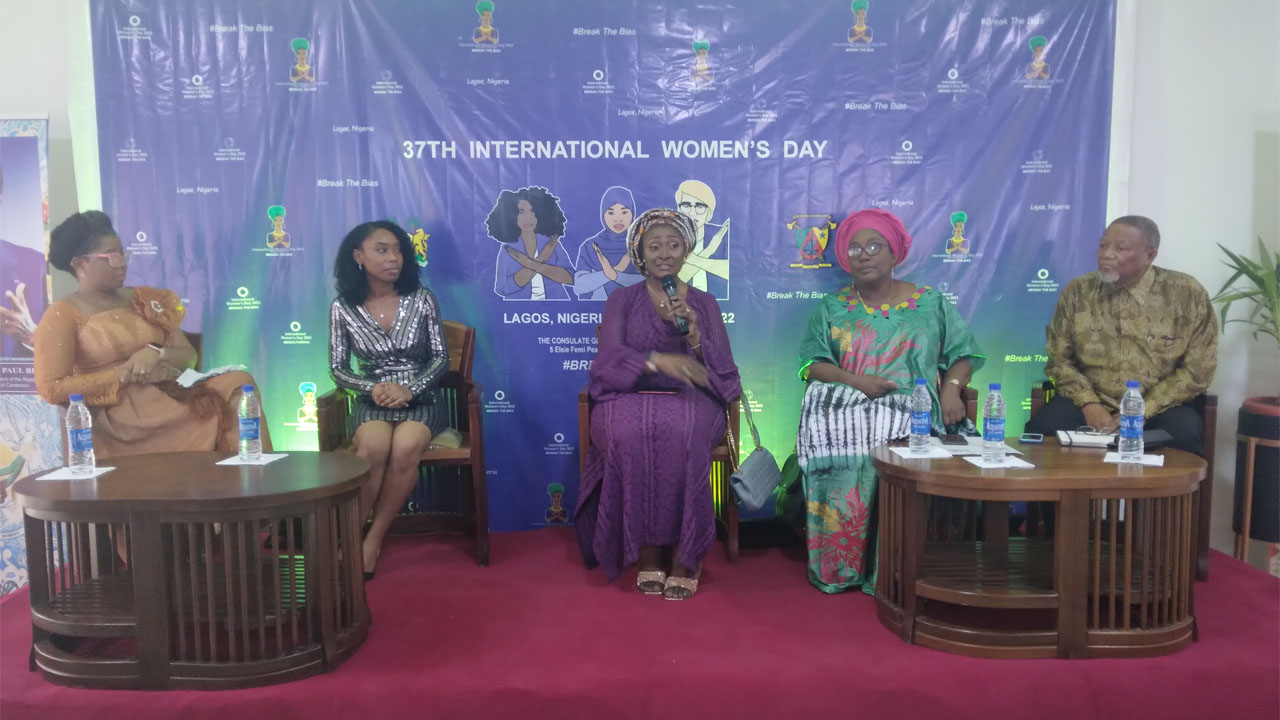
Africa is not left out in the struggle for gender balance and equality as it keeps searching for ways to deepen empowerment.
This was further buttressed as the envoys of Cameroun, Sierra Leone, and South Africa, commemorating the 37th International Women’s Day in Nigeria, over the weekend, held a dialogue on their achievements and learning points in promoting gender equality.
The event, held at the Consulate of Cameroun in Lagos, themed ‘Gender Equality for a Sustainable Tomorrow’ was jointly organised by the Consulates of Cameroun, Sierra Leone and the United Nations Information Centre (UNIC).
Consul General of Cameroun, Lagos, Bessem Manga, said Cameroun has evolved from having about 0.5 per cent on women involvement in government and diplomacy in the 90s to representations at the highest level.
She, however, noted that self-limitations and a mindset of inadequacy have made women back down from viable positions.
“We have made great progress with fighting for gender parity and it is up to us to further empower ourselves as women. It is important to have more women motivated and confident in their ability to take up leadership roles and while we act as mentors to young girls, we’ll be serving as pointers to a brighter future,” she said.
In November 2017, Manga was appointed as the first female Consul General in the history of Cameroonian diplomacy.
“The progress we have made in the past five years is enormous. For example, Cameroon had never had a female consul general before me and after this shift, we’ve seen an improvement with female representation,” Manga said.
Other countries in attendance included Togo, Mali, Democratic Republic of Congo, Nigeria, The Gambia and Benin Republic.
Minister of State, Office of the Vice President of the Republic of Sierra Leone, Francess Algahli, stressed that there are no legal restrictions that prevent women from obtaining positions in governance or management, but added that there are, however, few women in elective and management positions.
She explained that it is caused by economic and educational factors.
“Since colonial times, these have been one of the reasons women have been unable to attain higher-level positions. In those days, families preferred to educate the boy child because they felt that women should just get married and have babies rather than aspire for self-actualisation.
“This historic education deficit is one of the reasons women have been unable to move at the pace we want them to,” she said.
For economic empowerment, Algahli said a woman needs economic power to be elected into certain positions.
According to her, the government has put emphasis on education of the girl-child by putting in place regulations to maintain girls in school, while others have ensured there is a percentage of women in their offices.
“We also have the gender empowerment policy, which has been approved by the government. In that policy, there is a conscious effort required by all ministries and agencies to ensure there is a certain percentage of women in the management level.
“This is the backbone of the Gender Empowerment Bill, which is currently in Parliament that government is trying to legislate,” she added.
South Africa Consul General to Nigeria, Mr Darkey Africa, speaking on the success rate of the campaign on gender equality in South Africa, said the struggle for emancipation of women in his country started during the apartheid era and one of the greatest women that led it was Charlotte Maxeke, who was the first woman in the nation to get a degree in the U.S.. She went on, he explained, to form Bantu Women’s League (BWL), which demanded better working conditions for women and advocated anti-pass laws.
“In 1934, the women of South Africa developed a Women’s charter to say they want same rights as men and they made an interesting statement that if the men go to jail, they would also go to jail, because they cannot raise the children alone. “What women said in the charter, was incorporated in the Freedom Charter, resulting in a clause, which says all shall be equal before the law.
He added that there are systems that allow women participation in all sectors of the society, adding that South African women fought against imbibed actions, where women were suppressed because of their gender.
“Therefore we in South Africa realised that we need to develop legislature that allows for 50-50 participation,” Africa said.
He stated that there is a Commission for gender equality, which overseas all government and private entities to ensure they follow the laws of the country on women.
“Without the capacity of women, we have told ourselves that the country cannot move forward. Any country that does not recognise the potential of women does so at its detriment,” he said.
He noted that a woman is the current speaker of National Assembly and there are female Mayors, adding that many women are leading companies in the private sector. According to him, a summit was held to ensure that all law enforcement agencies and departments’ aids gender balance so that women are not subjected to perpetual fears.
“In South Africa, the commissioner of gender equality is there to ensure that every time they want to make an assessment, they go to all departments in government and private sectors to push the mandate,” Africa explained.



